by Brian Coe | AHL On The Beat Archive
In his first four years as head coach of the Wilkes-Barre/Scranton Penguins bench, John Hynes has guided the club to a 58-win season (second-best in league history), collected 186 regular season victories (the most of any club in that time frame), and led the Pens to four consecutive Calder Cup Playoff appearances (including back-to-back trips to the Eastern Conference Final).
And while all of those accomplishments are notable, the team’s defensive record during the past four seasons may be the most impressive.
From the 2010-11 campaign through the 2013-14 season, the Penguins allowed 761 goals in 308 games. That’s an average of just 2.47 goals against per game, the best mark in the league in that time.
What’s more, the team allowed the fewest goals against in three of those four outings (2010-11; 2012-13; 2013-14).
But what is it about the Penguins and defense? Why has the team been so successful in keeping the puck out of its own net under Hynes’ tutelage?
According to the coach, there are several factors that combine to make Wilkes-Barre/Scranton one of the stingiest teams in the American Hockey League year in and year out.
“I think one is the character players that we get,” said Hynes. “When you have a team that’s very strong defensively, I think it speaks a lot about the type of leaders you have on your team, because even your best offensive players have to be committed to play both sides of the puck. And I think that’s something that we do preach as a coaching staff, but it’s really driven by the players and the leaders on our team. That’s been a key component to it.”
So character plays a big part: having players committed to playing within a system no matter what their own area of expertise.
But what is that system?
Well, without getting into too many Xs and Os, the Pens success has been predicated on puck possession.
“Your best defense is being able to play offense. And a good part of being a team that has a low goals-against average is how you play with the puck,” Hynes commented. “It’s making smart puck decisions; it’s possessing the puck, whether it’s coming out of your own zone through the neutral zone and particularly in the offensive zone. We stress, teach, and talk a lot about puck possession and puck decisions that allow us to try to play the majority of the game on offense.”
From a goaltender’s point of view, having your team hold onto the puck for the majority of the game makes your job that much easier.
“If you have the puck the whole game, obviously there’s not going to be much offense against you,” said rookie netminder Matt Murray, whose own accomplishments this season (10 shutouts and a league-leading 1.59 goals against average as of March 30), have been helped along by the players in front of him.
“We give up a lot less shots than other teams in the league, a lot less grade-A scoring chances too, I would say. Our team’s been real solid all season long making the goalie’s job easier.”
Defenseman Brian Dumoulin, who ranked among the league-leaders with a plus-18 rating after this past weekend’s games, also stressed the importance play with the puck.
“This year we’ve been really emphasizing making smart plays with the puck and not giving it to the other team,” he said. “You can always control defense…offense comes and goes, guys get hot and not. If you only let in one goal or two goals a game, then you’re in every game.”
Sounds like a no-brainer, right? Hold onto the puck, and the other team can’t score.
But there are two teams on the ice, both with the same objective – to win the game. So what happens when the other team has the puck?
The short answer – you try to get it back.
“There are so many different things that go into the system. It’s the compete level and battle level at the puck, I think, that’s the biggest thing,” said third-year forward Jayson Megna, who was tied for the team lead with 20 goals after scoring in a 3-1 win over the Binghamton Senators on March 27. “You see it even now when we’re doing battle drills in practice and two-on-twos in the corners. It’s pressure with a purpose, it’s strong puck support. Everyone has a high compete and battle level on the team, everyone’s supporting each other.
“If you don’t have that battle level and compete, then any system you play is going to be meaningless.”
Hynes echoed Megna’s sentiments.
“When we don’t have [the puck], the players understand that the harder they work and the more structure they play in, that they’re going to be able to get pucks back quicker and easier. If they play together as a five man unit defensively, it transitions to offense better than it does if you don’t have that commitment level.”
“Defense is the hardest part of the game. You have to have that commitment, you have to have that kind of grit to your game,” Murray stated. “If you’re a really skilled offensive guy, that’s easy. [Skill] comes easy to you.
“But defense is all about work. It doesn’t matter what kind of skill level you have, you can still be a good defensive player.”
A lot of times, mentioning that a team plays a defensive-style of game carries a negative connotation. But Megna doesn’t see defensive prowess excluding offensive production.
“I don’t think it restricts you. We obviously like to play a certain way. We’d rather win 2-1 than 5-4.” he said. “We have skilled guys in this room, we want to take care of the puck and that turns into being a lower scoring game for the other team. But when we play to our system, we’re allowed to make plays. There’s no ‘get across the red line and dump the puck in.’ We have skilled guys who can make plays here.
“Playing within the system allows our skill to come out on the other side of the puck.”
Murray sees the results on the offensive side of the puck from the other end of the ice.
“We play a solid game that is very focused on the system, but allows players to use their skill in the system” he stated. “We’re not really looking for guys to dangle and dance through the whole team. But we play a system that coach Hynes puts in place that gives guys the opportunity to show their skills, show their speed, show their shots, and kind of create space for guys.
“That’s a recipe for a winning team, not just relying on skill, because skill only gets you so far.”
The one word that every player on the team mentions – and may be the most important to the team’s success – is ‘accountability.’
“Coach Hynes is real good at holding guys accountable for playing defense,” Murray noted. “The guys in the room here are good at holding each other accountable: always blocking shots, always in the right position defensively.”
“The coaches instill it, they kind of drill it into you in training camp and the first couple of months of the season,” said Megna. “Then when we get to a point like now, where everybody knows what we’re trying to do, everybody knows the system; you’re playing for the guy next to you.”
Hynes believes empowering his players early in the season behind the scenes also helps that commitment and accountability.
“We usually sit down and set team goals. And the players participate in that,” said Hynes, who has won more games in the past four-plus seasons (224) than any other active AHL coach. “A big part of it is the investment by the players that some of those things, like defensive goals, come from them. And I think when it comes from the players, they’re more invested in it.
“They realize that when they play better collectively, it’s always better for the individual. That’s been probably the biggest reason why we’ve been able to be so successful.”
Conversely, the players see the benefits brought to the team by the coaching staff of Hynes and assistant coach Alain Nasreddine.
“I think that they give us the best opportunity to win night in and night out,” said Megna. “The way that we practice, you can tell they’re trying to improve us as players and people. They want us to succeed, you can see that. They’re trying to make us better every day with all of the work that they do with video and the planning they put into practices.
“The hours that they spend in here are crazy. But they do it because they want to win. And so do we as players, so it’s a good fit.”






































